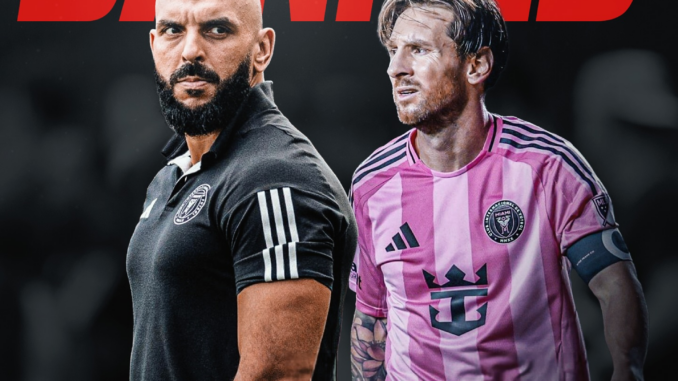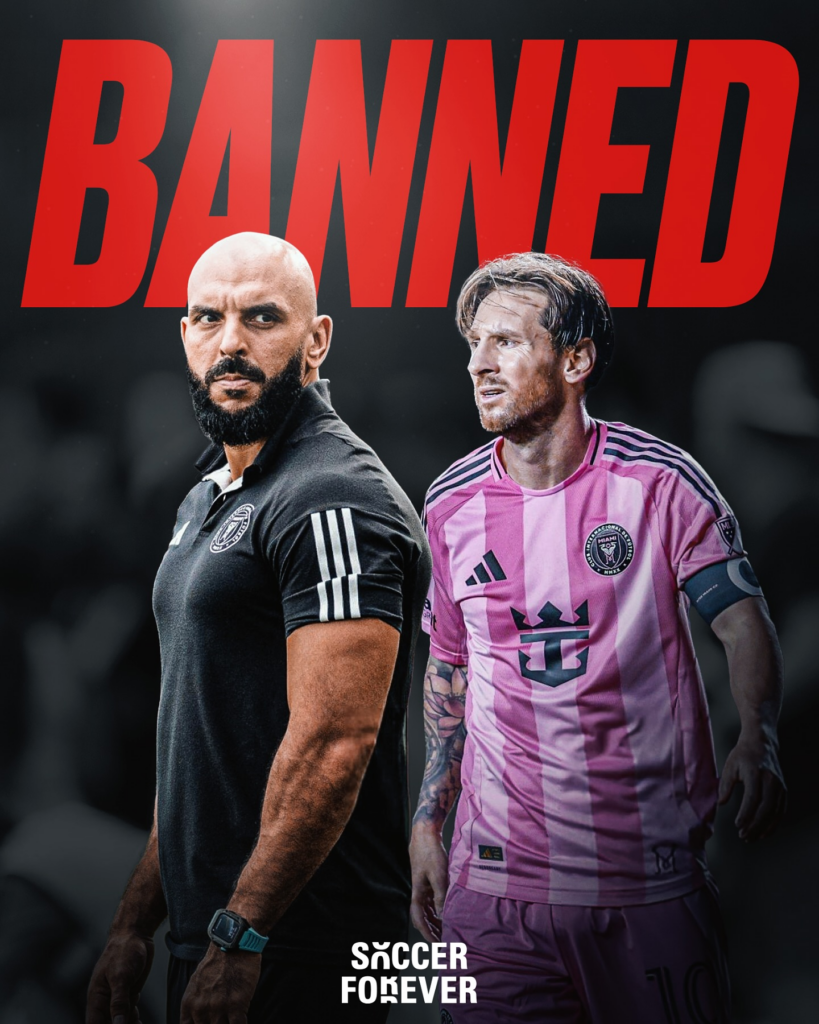
The MLS Bans Lionel Messi’s Bodyguard from the Pitch: Yassine Cheuko Responds
In a surprising move, Major League Soccer (MLS) has banned Yassine Cheuko, the bodyguard of football superstar Lionel Messi, from entering the pitch during matches. The decision has sparked significant backlash, particularly from Cheuko himself, who has expressed his dissatisfaction with the new rule, which he believes undermines his role in ensuring Messi’s safety.
The Ban: A Controversial Decision
The ban on Messi’s bodyguard comes amid growing concerns about player safety in sports, as MLS has recently introduced stricter safety protocols for stadiums. While the intention behind the policy is to control the presence of non-players on the field, the decision to bar Cheuko from accessing the pitch has raised eyebrows, particularly given his essential role in protecting one of the world’s most high-profile athletes.
Yassine Cheuko, a former special forces operative with extensive security experience, has been assigned to protect Messi since the Argentine star’s arrival at Inter Miami in 2023. Cheuko, who earns a reported $60,000 per month for his services, has become a key figure in ensuring Messi’s safety on and off the field. However, the new rules have placed a serious constraint on his ability to do his job effectively.
Cheuko’s Response: “Let Me Help Messi”
Unhappy with the decision, Cheuko has spoken out, questioning the logic behind the MLS’s actions. In a statement that has been widely shared in the media, Cheuko said:
“I have been in the USA for 20 months, and 16 people have already invaded the pitch. I am not the problem. Let me help Messi.”
Cheuko’s words reflect his frustration with the league’s decision to single him out while not addressing the broader issue of pitch invasions, which have been increasingly common in MLS matches. He pointed out that during his time in the U.S., multiple individuals have run onto the field without significant security intervention. In his view, his presence on the pitch is a necessary measure to ensure Messi’s safety, particularly given the immense popularity of the football legend.
A Growing Concern Over Safety
The issue of player safety has become a significant topic of discussion, not just in MLS but across global football. In recent years, the number of pitch invasions has risen, with spectators increasingly crossing the barriers separating them from the players. While pitch invasions are not new to the sport, the rise in frequency has led to concerns about the safety of athletes, particularly high-profile figures like Messi, whose celebrity status makes him a prime target for overzealous fans.
In light of these concerns, MLS has implemented new protocols that aim to restrict access to the field during matches. These measures are intended to minimize the risk of harm to players, coaches, and other staff members. However, this has created a dilemma for Messi’s security team, with Cheuko being one of the most prominent individuals affected by the change.
Messi’s Security: A Vital Role
As Messi’s personal bodyguard, Yassine Cheuko’s role extends beyond simply protecting him from physical harm. Messi, who has experienced his share of security challenges due to his fame, requires constant vigilance to avoid potential threats from fans or other individuals with malicious intent. Cheuko’s presence on the pitch during matches has been seen as an important aspect of Messi’s security, particularly given the unpredictable nature of live events.
While MLS has expressed its commitment to player safety, the ban on Cheuko seems to undermine the efforts of Messi’s security team. Messi’s supporters have also voiced concerns that this decision could make it more difficult for the soccer star to feel safe during matches, potentially putting him at risk in a crowded and chaotic stadium environment.
The Bigger Picture: Security or Overreach?
While the MLS’s new rules are meant to standardize security protocols, they have inadvertently sparked a debate over whether they go too far in limiting personal security. Critics argue that restricting a bodyguard’s ability to access the pitch may ultimately put players, particularly high-profile athletes like Messi, in a more vulnerable position.
Some have suggested that rather than banning bodyguards from the field, MLS should focus on improving overall stadium security to prevent pitch invasions from happening in the first place. This would allow security personnel, like Cheuko, to do their jobs more effectively while still maintaining a safe environment for both players and spectators.
Looking Forward: Will the Rule Change?
The decision to ban Cheuko has generated significant media attention, and it remains to be seen whether the MLS will reconsider its stance on the issue. With many fans and sports security experts voicing their support for Cheuko’s role, there is growing pressure on the league to find a solution that balances the safety of players with the need for strict security protocols.
In the meantime, Messi and his team will likely continue to navigate this new challenge, and Cheuko will remain committed to his mission of keeping the soccer legend safe. As the controversy unfolds, the question remains: will MLS amend its policies to accommodate the specific needs of players like Messi, or will the current restrictions remain in place?
